The places where Greek locals can call home are changing – and, in some cases, disappearing – as short-term holiday rentals cannibalise long-term housing arrangements.
But Nolan’s time on the picturesque Cycladic island – famed for its blue-and-white painted houses – may be about to come to an end. Her landlord and landlady are asking her to leave the apartment she has lived in for five years so they can rent part of the property on Airbnb.
“They’re an elderly couple and they stay in the apartment above me for a month or two each summer,” she explains. “They told me they want my apartment back because they are struggling with the stairs. But when I suggested I move upstairs instead, they said their son wants to turn it into an Airbnb.”
Two-bed apartments like Nolan’s in her area of Paros average about 80 euros a night, versus Nolan’s 100-euro per month rent. That makes earning potential for landlords much higher, especially throughout the high season of June, July and August. This income disparity is one of the reasons that, although Nolan’s contract doesn’t end until next April, they are taking her to court to force her out earlier.
She is struggling to find a new home. Nelson lives across the road from her daughter, Katerina Bamboulis, and sees her every day. However, if she can no longer afford the cost of living, she says she may need to return to the UK for better work opportunities, and leave these close ties behind.
Housing challenges like these are becoming increasingly common in places where tourism is thriving: the number of short-term rentals is eclipsing the number of places where locals can live.

‘There isn’t anywhere for them to go’
Short-term holiday rentals have caused housing shortages and rent increases in cities around the world. The impact has been significant in many small places such as the Greek islands, which are home to intimate local communities year round, but see huge crowds arrive in summer for holidays.
The island of Paros has a permanent population of just 13,000, but its visitor numbers have grown recently: between 2014 and 2017, the number of overnight stays increased from 332,418 to 421,418. According to data site Inside Airbnb, there are 2,435 listings on the island, 82.9% of which are entire homes or apartments.
Greece, in general, has a home ownership rate of 74% – one of the highest in Europe. It is common for middle class families to own several properties, some of which they save for their children and rent out in the meantime. However, following Greece’s debt crisis, during which its economy shrank by 26%, many landlords have taken properties off the long-term rental market in the hope they will make more money from short-term lets.
Most renters have been asked to leave because the owners want to Airbnb. But there isn’t anywhere for them to go – Colette Nolan
For many families whose household incomes were battered during the crisis, the ability to take advantage of Greece’s tourism industry and make some extra money through rental sites has provided a lifeline. But for those likely to be living in rented accommodation – such as single or divorced people, students, seasonal workers or doctors and teachers in temporary postings – these platforms’ popularity is causing housing shortages and pushing rents up.
“It used to be easy [to find a house on Paros],” says Nolan. “Now, it seems everyone’s looking. Most renters have been asked to leave because the owners want to Airbnb. But there isn’t anywhere for them to go.”
Nolan is used to paying her 100 euros a month rent, but the only comparable places now available for long-term rent are at least 300 euros a month. “When you add bills on top [ofand ma Greece’s relatively expensive utilities], it becomes a lot,” she says. “And we don’t have a lot of money here. We work in the summer and then do whatever odd jobs we can in the winter … I work in a hotel, and in winter I teach a bit of English and do cleaning for people.”
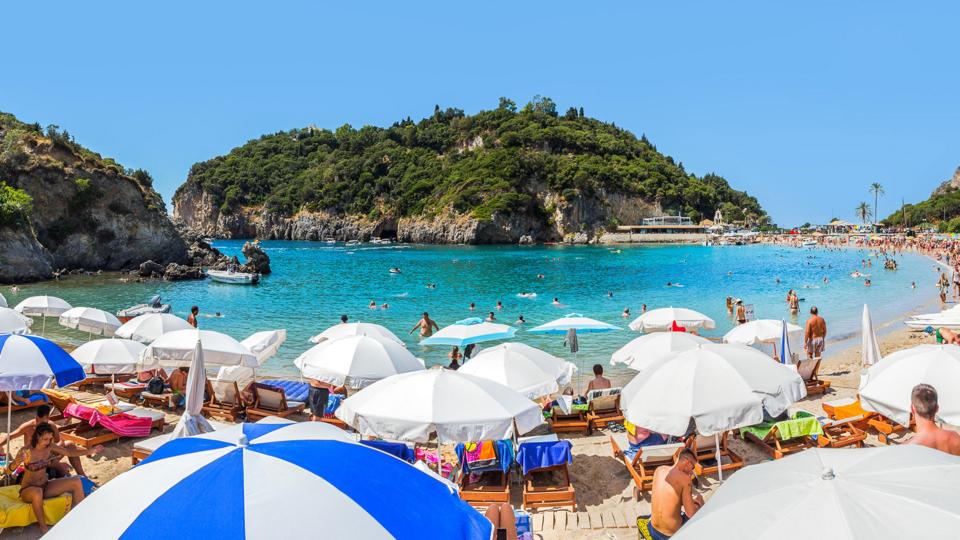
Nolan’s daughter Bamboulis finds the situation complicated, as she manages holiday villas on the island for a living, several of which are rented online. With her expertise, Bamboulis explains the perspective of the landlords on these holiday islands.
“With Airbnb I can make 10,000 euros in three months [of rental]. I pay 2,000 euros tax, 2,000 euros for cleaners and damages and am left with 6,000 euros. If there’s a problem with the guests, Airbnb comes straight in and helps,” she says. In contrast, if she were to rent that same house as a long-term rental, she’d comparatively make 10,000 euros a year, pay 3,000 in tax and 3,000 in damages – a total of 4,000 euros net. “And if I have a [tenant] problem I can’t get them out. So, this is why a lot of people don’t want to do long-term rental.”
Along with the lower taxes and maintenance costs that landlords receive for short-term holiday rentals, Bamboulis says that many landlords favour Airbnb over working independently, since the platform provides landlords more support than Greece’s own legal system.
Bamboulis understands that landlords have more earning potential in short-term rentals, but also believes that what is happening to her mother is unfair. “If the Greek state supported long-term rentals the way it does short-term, we wouldn’t have this problem.”
‘We have our own lives here’
On the other side of the country, on the Ionian island of Corfu, a similar situation is playing out. Corfu is larger than Paros – 102,000 people live here all year round – and the island also has a university. But the prevalence of short-term holiday rentals in the main town has led to students having to live in hotels, and local people struggling to find suitable housing.
Nikoleta Pandi, 30, says that she and her mother spent two years trying to find an apartment together before finally settling for a one-bed on the outskirts of Corfu Town. She sleeps in the bedroom and her mum has the living room.
People either have to pay very expensive rent or live in Airbnbs themselves – George Tzimas
“I was living in a village, but I wanted to be in Corfu Town for work,” she says. She found prices for two-bedroom apartments had jumped from less than 200 euros a month five years ago to 500 euros or more. “We pay 350 euros [for our one-bedroom], which is really cheap,” she says, adding that they found the apartment through a family friend, which is “the only way” for locals to find living arrangements now.
Although living in such a tight space is “not the best”, Nikoleta says it hasn’t impacted the relationship with her mother too much because they aren’t viewing the set-up as long-term; Nikoleta is moving to Athens to start a master’s, and her mum will stay in the apartment.
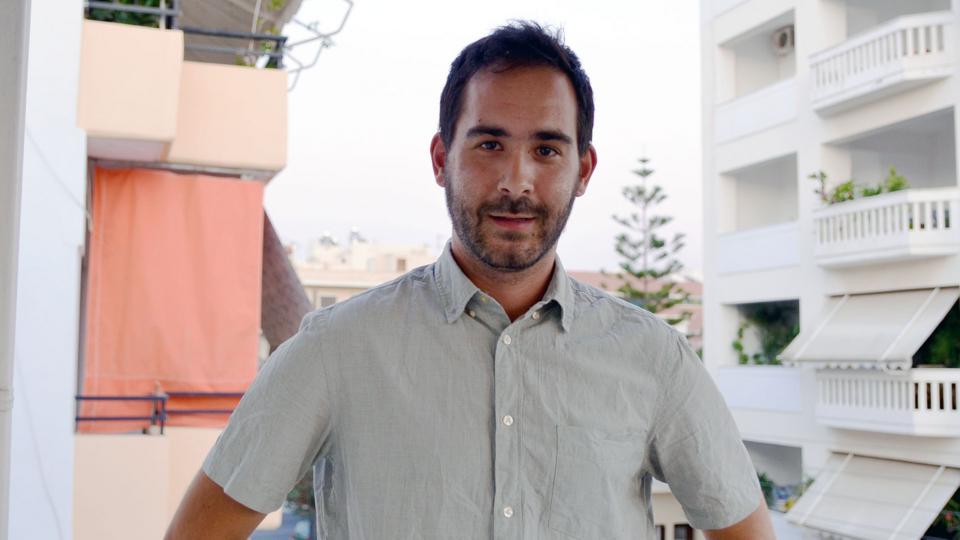
On other islands, anger at the situation is growing. George Tzimas, 28, an architectural student at the University of Crete in Chania, says that students feel discouraged from applying to the university because of the housing shortage. “People either have to pay very expensive rent or live in Airbnbs themselves,” he says.
Tzimas and other activists have been organising marches along Chania’s Old Venetian Harbour – a spot popular with tourists. “People who live on the island already know there’s a problem, so we want the visitors to see. We want them to know that we want to have our own lives here and it not just be a place for tourists. We do not even have a public park.”
Throughout the country, people are wondering whether Greece’s overall falling visitor numbers might dampen the Airbnb gold rush – airports around the country have recorded a 1.5% drop on average so far this year, and arrivals at Chania are down 5.6%.
“There might be a lot of disappointed Airbnb owners who decide it’s less trouble to get someone in for a year,” says Nolan. “At least, that’s what we’re hoping.”
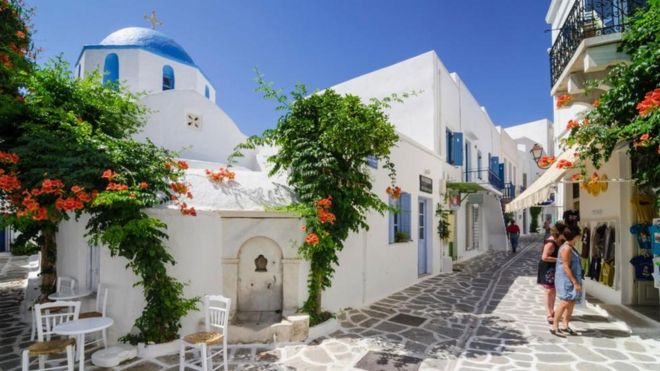 ALAMY Các hòn đảo nghỉ mát được ưa thích, gồm cả đảo Paros, bị tràn ngập bởi việc cho thuê ngắn hạn đến nỗi một số dân địa phương bị đẩy ra khỏi ngôi nhà đang thuê dài hạn của mình
ALAMY Các hòn đảo nghỉ mát được ưa thích, gồm cả đảo Paros, bị tràn ngập bởi việc cho thuê ngắn hạn đến nỗi một số dân địa phương bị đẩy ra khỏi ngôi nhà đang thuê dài hạn của mình‘Không còn nơi nào để đi’
Việc cho thuê kỳ nghỉ ngắn hạn đã gây tình trạng thiếu nhà ở và tăng tiền thuê ở các thành phố trên khắp thế giới. Tác động là rất lớn đối với các địa điểm nhỏ bé như các hòn đảo này của Hy Lạp, là nơi ở của các cộng đồng địa phương thân thuộc quanh năm, nhưng phải chứng kiến những đám đông khổng lồ đến nghỉ vào mùa hè.
Đảo Paros có dân số thường xuyên chỉ là 13.000, nhưng số lượng khách gần đây đã tăng: từ 2014 đến 2017, số lượng khách lưu trú qua đêm đã tăng từ 332.418 lên 421.418. Theo trang dữ liệu Inside Airbnb, có 2.435 điểm đăng ký cho thuê trên đảo, 82,9% trong số đó là toàn nhà hoặc căn hộ.
Nói chung Hy Lạp có tỷ lệ sở hữu nhà là 74% – một trong những mức cao nhất ở Châu Âu. Thông thường các gia đình trung lưu sở hữu nhiều nhà, một sô nhà là dành cho con cái họ và cho thuê trong khi chờ đợi. Tuy nhiên, sau cuộc khủng hoảng nợ ở Hy Lạp, mà khi khủng hoảng kinh tế giảm 26%, nhiều chủ nhà đã rời bỏ thị trường cho thuê dài hạn với hy vọng kiếm được nhiều tiền hơn qua việc cho thuê ngắn hạn.
Đối với nhiều gia đình mà thu nhập gia đình bị lụn bại trong cuộc khủng hoảng thì khả năng tận dụng lợi thế của ngành du lịch Hy Lạp và kiếm thêm được tiền thông qua các trang web cho thuê nhà là sự cứu sinh. Nhưng đối với những người đang sống trong những căn nhà thuê – như người độc thân hoặc ly dị, sinh viên, người làm việc thời vụ hoặc bác sĩ và giáo viên ở cương vị tạm thời – việc ưa thích nền tảng kỹ thuật này đang gây ra tình trạng thiếu nhà ở và tăng giá thuê nhà.
“Trước đây tìm thuê nhà ở Paros là dễ dàng,” Nolan nói. “Giờ đây có vẻ mọi người đều đang tìm nhà. Hầu hết người đang thuê bị yêu cầu rời đi vì chủ nhà muốn áp dụng Airbnb. Nhưng không còn nơi nào để họ đi.”
Nolan đã từng trả 100 euro tiền thuê nhà mỗi tháng, nhưng nay những nơi tương đương như vậy để thuê dài hạn ít nhất là 300 euro mỗi tháng. “Nếu cộng thêm các chi phí dịch vụ, số tiền sẽ nhiều lắm.” bà nói. “Ở đây, chúng tôi không có nhiều tiền. Chúng tôi làm việc vào mùa hè và sau đó làm bất kỳ công việc vặt vãnh nào có thể vào mùa đông …tôi làm việc trong một khách sạn, và vào mùa đông tôi dạy một chút tiếng Anh và làm việc quét dọn cho người ta.”
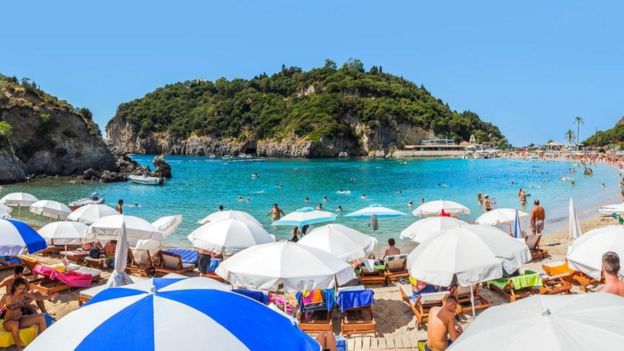 ALAMY Sự thịnh hành của việc cho thuê kỳ nghỉ ngắn hạn trên đảo Corfu của Hy Lạp đã dẫn đến việc sinh viên phải vào ở trong khách sạn
ALAMY Sự thịnh hành của việc cho thuê kỳ nghỉ ngắn hạn trên đảo Corfu của Hy Lạp đã dẫn đến việc sinh viên phải vào ở trong khách sạnCon gái Bamboulis của Nolan thấy tình hình là phức tạp do cô quản lý các biệt thự nghỉ mát trên đảo để kiếm sống, nhiều biệt thự trong số đó được thuê qua trực tuyến. Với chuyên môn của mình, Bamboulis giải thích viễn cảnh của chủ nhà trên các hòn đảo nghỉ mát này.
“Với ứng dụng Airbnb người ta có thể kiếm được 10.000 euro trong 3 tháng cho thuê, phải trả 2.000 euro thuế, 2.000 euro cho việc dọn dẹp và sửa chữa và còn lại 6.000 euro. Nếu có rắc rối với khách thì Airbnb sẽ đến và hỗ trợ,” cô nói. Ngược lại, nếu cho thuê dài hạn căn nhà đó, cô sẽ kiếm được 10.000 euro mỗi năm, trả 3.000 thuế và 3.000 tiền sửa chữa – tổng cộng là 4.000 euro. “Nếu có một vấn đề với người thuê nhà, thì người ta không đuổi họ được. Vì vậy, đây là lý do tại sao rất nhiều người không muốn cho thuê dài hạn.”
Cùng với thuế và chi phí bảo trì thấp hơn đối với chủ nhà khi cho thuê kỳ nghỉ ngắn hạn, Bamboulis nói rằng nhiều chủ nhà thích ứng dụng Airbnb hơn là làm việc độc lập, vì nền tảng này cung cấp cho chủ nhà nhiều sự hỗ trợ hơn hệ thống pháp lý của Hy Lạp.
Bamboulis hiểu rằng chủ nhà có nhiều tiềm năng kiếm tiền hơn trong việc cho thuê ngắn hạn, nhưng cũng tin rằng những gì đang xảy ra với mẹ cô là không công bằng. “Nếu nhà nước Hy Lạp hỗ trợ cho thuê dài hạn giống như với cho thuê ngắn hạn thì chúng tôi đã không gặp khó khăn này.”
‘Chúng tôi đang có cuộc sống của riêng mình ở đây.’
Ở phía bên kia của đất nước này, trên đảo Ionia của Corfu, tình trạng tương tự đang diễn ra. Corfu rộng hơn Paros – 102.000 người sống quanh năm ở đây – và hòn đảo này cũng có một trường đại học. Nhưng sự thịnh hành của việc cho thuê kỳ nghỉ ngắn hạn ở thị trấn chính đã dẫn đến việc sinh viên phải sống trong khách sạn, và người dân địa phương phải cực nhọc để tìm nơi ở thích hợp.
Nikoleta Pandi, 30 tuổi, nói rằng cô và mẹ cô đã mất 2 năm cố tìm một căn hộ để cùng ở để rồi cuối cùng thuê căn 1 phòng ngủ ở ngoại ô thị trấn Corfu. Cô ngủ ở phòng ngủ và mẹ cô ngủ ở phòng khách.
“Trước tôi sống ở một làng, nhưng tôi muốn đến thành phố Corfu để làm việc,” cô nói. Cô thấy giá căn hộ hai phòng ngủ đã tăng từ dưới 200 euro một tháng 5 năm trước lên 500 euro hoặc hơn nữa. “Chúng tôi trả 350 euro cho một phòng ngủ, là giá rất rẻ,” cô nói, do quen biết một người bạn của gia đình, đây là cách duy nhất để dân địa phương tìm được chỗ ở bây giờ.
Mặc dù sống trong một không gian chật hẹp như vậy “không phải là nơi tốt nhất,” Nikoleta nói rằng điều này đã không ảnh hưởng nhiều quá đến mối quan hệ với mẹ vì họ không xem việc dàn xếp này là lâu dài; Nikoleta sẽ chuyển đến Athens để học lấy bằng thạc sỹ, và mẹ cô sẽ ở lại căn phòng này.
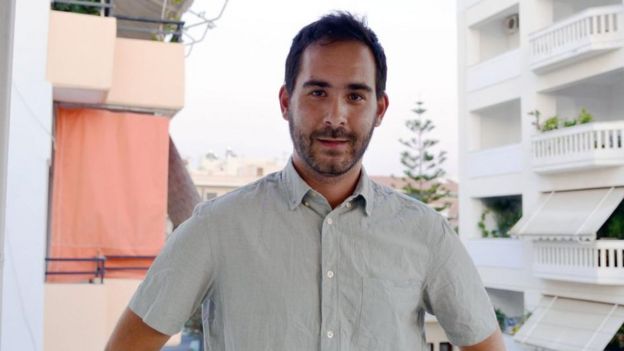 ALAMY Người dân địa phương bao gồm cả George Tzimas, 28 tuổi, nói rằng sinh viên ngần ngại nộp đơn vào các trường đại học địa phương vì sợ rằng họ sẽ không thể tìm được nơi ở
ALAMY Người dân địa phương bao gồm cả George Tzimas, 28 tuổi, nói rằng sinh viên ngần ngại nộp đơn vào các trường đại học địa phương vì sợ rằng họ sẽ không thể tìm được nơi ởTrên các hòn đảo khác, sự tức giận về tình hình này đang gia tăng. George Tzimas, 28 tuổi, một sinh viên kiến trúc tại Đại học Crete ở Chania, nói rằng sinh viên không muốn nộp đơn vào trường đại học này vì thiếu nhà ở. “Người dân hoặc sẽ phải trả tiền thuê nhà rất đắt hoặc phải sống thuê qua Airbnbs,” anh nói.
Tzimas và các nhà hoạt động khác đã và đang tổ chức các cuộc tuần hành dọc theo cảng Cảng Venetian ở Chania – một địa điểm nổi tiếng của du khách. “Dân trên đảo đã biết ở đây có vấn đề, do vậy chúng tôi muốn du khách thấy việc này. Chúng tôi muốn họ biết rằng chúng tôi muốn có cuộc sống của riêng mình ở đây và nó không chỉ là một nơi dành cho khách du lịch. Chúng tôi thậm chí không có được một công viên công cộng.”
Trên khắp đất nước, mọi người đang tự hỏi liệu tổng lượng du khách giảm xuống của Hy Lạp có thể làm nguội cơn sốt thuê nhà Airbnb hay không – các sân bay trên cả nước đã ghi nhận mức giảm trung bình 1,5% trong năm nay, và lượng khách đến Chania giảm 5,6%.
“Có thể có rất nhiều chủ sở hữu Airbnb thất vọng, họ cho rằng cho ai đó thuê nhà cả năm là ít rắc rối hơn,” Nolan nói. “Ít nhất đó là những gì mà chúng tôi hy vọng.”
